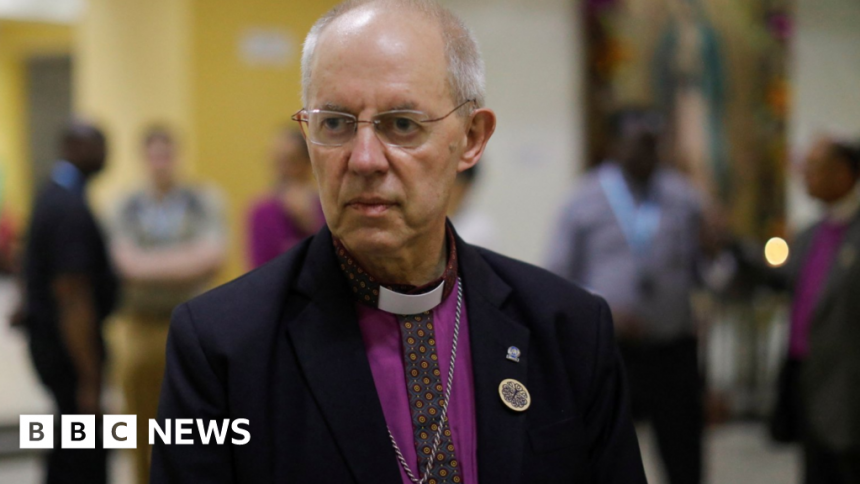Survivor calls for Welby to resign over Church abuse scandal
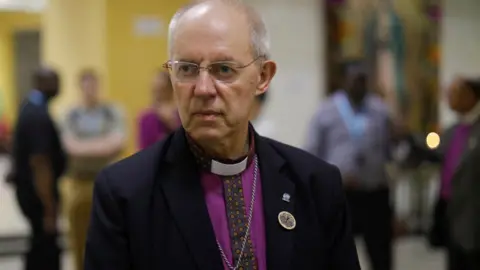 PA Media
PA MediaA survivor of abuser John Smyth has called for the Archbishop of Canterbury Justin Welby to resign over his failure to act after learning about the abuse in 2013.
Andrew Morse told the BBC he was abused for four years from when he 17 during the 1970s and 1980s and described being beaten by the British barrister whom he met at Winchester College.
He said he felt Justin Welby’s admission that he had not done enough in response to the reports meant that the Archbishop and the Church of England had effectively been involved in a “cover-up”.
Lambeth Palace has said Mr Welby has no intentions of stepping down from his role.
Mr Morse’s calls for the archbishop to quit come after a recent independent review, led by Keith Makin, found Smyth might have been brought to justice had Mr Welby reported the matter to police when he first heard about it shortly after taking up his office in 2013.
The review said that from July 2013, “the Church of England knew, at the highest level, about the abuse that took place in the late 1970s and early 1980s”, naming Mr Welby specifically in a group which would have had knowledge.
It found that the “several opportunities were missed” to make a formal report of the abuse to police in the UK.
The review says “there was a distinct lack of curiosity shown by these senior figures and a tendency towards minimisation of the matter”.
“I think his admission that in 2013, which is really modern day in comparison to the 1970s and 1980s, that he didn’t do enough, that he wasn’t rigorous, that he was enacted is enough in my mind to confirm that Justin Welby along with countless other Anglican churchmen were part of a cover-up about the abuse,” Mr Morse told BBC Radio 4’s Today programme.
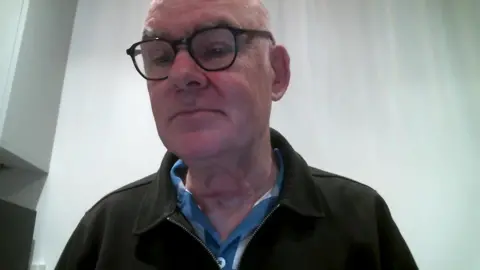
Smyth, who died in his 70s in Cape Town in 2018, was accused of attacking boys at his Winchester home who he had met at a Christian summer camp in Dorset during the 1970s and 1980s.
Mr Morse said he met Smyth at Winchester College where chapel services and evangelical Christian meetings were held to which Smyth was invited as an outsider to talk.
“I believe he was a predator,” Mr Morse said.
“He picked on a few boys within that group, befriend us, invited us back out to lunch at his family home and slowly over the years became a sort of father figure to me.”
Mr Morse explained Smyth built a relationship which then became more physical and violent.
Smyth introduced the notion to Mr Morse that he was “sinning” and needed to “mark those sense in a form of repentance that really would mean something to the Lord”.
“On my 21st birthday John Smyth told me that I was still sinning and that I required what he called a ‘special beating’,” he said.
“That was beatings of hundreds of lashes of a cane and I realised that I couldn’t take things any longer.
“I firstly wrote a couple of anonymous letters to Christian leaders and to John Smyth but when those had no affect and I decided to take my own life.”
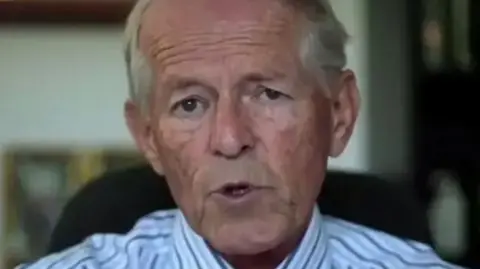
Reports of Smyth’s physical abuse of boys were revealed in an investigation by Channel 4 News in February 2017.
The investigation came after a report by the Iwerne Trust in 1982, which was not made public until 2016.
The Makin review reports that despite his “appalling” actions having been identified in the 1980s, he was never fully exposed and was therefore able to continue his abuse.
Smyth was encouraged to leave the UK and he moved to Zimbabwe without any referral being made to police.
In Zimbabwe he was charged with the manslaughter of a 16-year-old boy, who was attending one of his summer camps. Smyth was not convicted of the offence.
During this time, church officers “knew of the abuse and failed to prevent further abuse”, the independent review led by Keith Makin says.
Mr Morse told the BBC he believes the “cover-up” extended until 2017 when Channel 4’s report was broadcast which then led to a “proper police investigation”.
“That had nothing to do with the Church or Justin Welby or the actions of Lambeth Palace,” Mr Morse said.
“It was the outside media who held the Church to account.
“I think even by their own rules they should have been much more proactive. John Smyth was still alive at this time.
“We know now he was abusing teenagers in Africa so there was plenty of opportunity for that to stop and for the police to become involved.
“It is those African lives and those African victims that are very much on my conscience – and I would hope on the archbishop’s conscience too.”
Mr Morse explained he believes if Mr Welby steps down from his role as Archbishop of Canterbury then it would “be an opportunity to stand” with Smyth’s abuse victims.
“I think the church is incredibly stringent with its rules for every day vicars and those lower down the scale about what to do when abuse is reported to you,” Mr Morse said.
“I believe that now is an opportunity for him to resign.”
On Monday the Bishop of Newcastle, Helen Ann Harlety, became the most senior member of the clergy to call for the Archbishop to stand down.
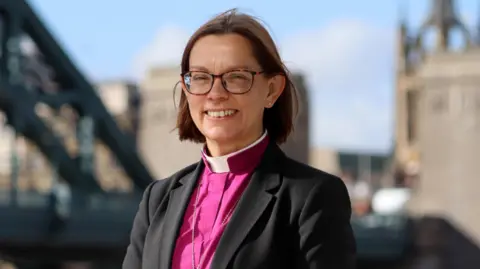 Diocese of Newcastle
Diocese of NewcastleBut, despite the growing calls and pressure on Mr Welby to quit, Lambeth Palace has said he has no intention to do so.
“The Archbishop reiterates his horror at the scale of John Smyth’s egregious abuse, as reflected in his public apology,” Lambeth Palace said.
“He has apologised profoundly both for his own failures and omissions, and for the wickedness, concealment and abuse by the church more widely.
“As he has said, he had no awareness or suspicion of the allegations before he was told in 2013 – and therefore having reflected, he does not intend to resign.”
Winchester College told the BBC it apologises unreservedly for its part in the victim’s “terrible experiences”.
BBC Action Line: If you have been affected by issues in this story, find out what support is available here.



